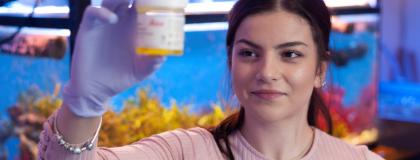
Marine and Freshwater Biology Co-op Information for Employers
Adding Value to Your Team
The Marine and Freshwater Biology co-op major provides a broad perspective on aquatic environments based on the physical as well as the biological sciences. Students build upon core courses in ecology, evolution, genetics, and physiology of aquatic biota as they study freshwater and marine environments and work with aquatic organisms experimentally in the field and in the lab. They perform independent research projects under a variety of field and laboratory conditions to enhance their learning experience and participate in co-op work terms to gain knowledge and skills in a workplace setting.
University of Guelph Advantage
The Marine and Freshwater Biology major capitalizes on Guelph’s recognized excellence in aquatic research. The state-of-the-art Hagen Aqualab on campus allows researchers and students to simulate global aquatic environments and maintain a wide variety of marine and freshwater flora and fauna in Guelph. This program prepares students for post-graduate work in the aquatic sciences and provides a sound scientific background for students pursuing careers in biology, management and conservation, aquaculture, biotechnology, education, and research in government, academic, or private sectors.
Students do not begin their first work term until they have completed 2 years of study and have mastered the core competencies needed to be successful in their work terms. Students are available for up to five work terms (4 or 8 months) and employers can post, interview and hire throughout the semester.
Student Strengths
Experience-Backed Understanding
Advanced understanding and appreciation of living aquatic organisms and specimens obtained through hands-on experience in the field and laboratory.
Data Analysis
Ability to collect and assemble biological data and apply mathematical and statistical methods to the interpretation of data to address questions in aquatic biology.
Critical Thinking
Ability to characterize and integrate the diversity of biological, chemical, and physical features that structure marine and freshwater aquatic environments.
Marine and Freshwater Biology Co-op Work Term Schedule
| YEAR | FALL | WINTER | SUMMER |
|---|---|---|---|
| ONE | Academic | Academic | Off |
| TWO | Academic | Academic | Work |
| THREE | Academic | Work | Work |
| FOUR | Academic | Academic | Work |
| FIVE | Work | Academic |
Marine and Freshwater Biology Course Sequencing
Please see the current undergraduate calendar for more information.
Fall
- General Chemistry I
- Elements of Calculus I
- Physics for Life Sciences
- Discovering Biodiversity
- 1 Liberal Education elective
Winter
- Introduction to Molecular and Cellular Biology
- General Chemistry II
- Biological Concepts of Health
- Physics for Life Sciences II
- 1 Liberal Education elective
Fall
- Ecology
- Evolution
- Introduction to Co-operative Education
- Vertebrate Structure and Function
- 2 electives/restricted electives
Winter
- Introduction to Biochemistry
- Foundations in Molecular Biology and Genetics
- Biostatistics for Integrative Biology
- Invertebrate Morphology and Evolution
- 1 elective/restricted elective
Summer
Work Term One
Fall
- Introduction to Aquatic Environments
- Comparative Animal Physiology I
- Lab Studies in Animal Physiology I
- Integrative Biology of Invertebrates
- 2 electives/restricted electives
Winter
Work Term Two
Summer
Work Term Three
Fall
- Limnology of Natural and Polluted Waters
- Integrative Marine and Freshwater Research
- 2 electives/restricted electives
Winter
- Populations, Communities and Ecosystems
- Developmental Biology
- Comparative Animal Physiology II
- Lab Studies in Animal Physiology II
- 2 electives/restricted electives
Summer
Work Term Four
Fall
Work Term Five
Winter
- Adaptational Physiology
- Biology of Fishes
- Marine Ecological Processes
- 2 electives/restricted electives
